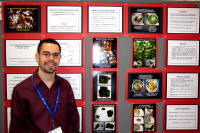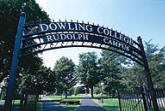Study Chemistry in
New York
Department
of Chemistry Dowling College
The Chemistry BA and BS
degrees prepare students for employment in a wide variety of private
industries and governmental entities, or for graduate study in
chemistry and related fields. The BA in chemistry gives students
flexibility to pursue varied career goals by requiring fewer credits
for the major than the BS. Both degrees exceed the minimum chemistry
content required for secondary school teaching, and both prepare
students to pursue advanced degrees in the sciences and engineering
or in professional schools. The BA is recommended for students
interested in teaching or attending medical or law school since it
allows more electives that students may use to fulfill education
requirements for New York State Teacher Certification or to meet
other professional school requirements. Students interested in
chemistry PhD programs, however, should select the BS in chemistry.
Dowling offers courses in general, inorganic, organic, analytical,
instrumental, environmental, biological, and physical chemistry that
are enhanced by opportunities through internships, independent
study, research, and special topics courses. Students get hands-on
experience with modern and traditional instrumentation and
techniques in laboratories, class work, and field experiences,
including high pressure liquid chromatography (HPLC), gas
chromatography (GC), atomic absorption spectroscopy (AA), infrared
spectroscopy (IR), ultraviolet-visible spectroscopy (UV-Vis), mass
spectrometry (MS), and nuclear magnetic resonance spectroscopy (NMR).
Computer labs are equipped with tutorial software for IR, proton and
carbon NMR, mass spectrometry, and qualitative organic analysis.
SPARTAN molecular modeling and computational software is integrated
into laboratory courses.
Students conduct research at Dowling or with our collaborating
partners such as Brookhaven National Laboratory, the National Park
Service, U.S. Geological Survey, and other governmental, academic,
civic and industrial partners. Undergraduates may participate in
collaborative research opportunities that integrate chemistry with
computer science, environmental science, and biology. For example,
GIS (Geographic Information Systems) is a major technical tool
utilized by government, business and in health professions. The
Dowling GIS laboratory is equipped with computer-based,
data-intensive geographic-oriented technology providing remote
sensing and imaging technology that provides a critical contribution
to understanding a variety of impacts on society, ecosystems,
pollution levels and economic relationships. Students in the
chemistry program have the opportunity to work at Dowling and/or
with our partners in research areas such as global climate change,
environmental contaminants tracking, environmental monitoring and
inventories. The undergraduate program, along with active
internships at EPA, USGS, BNL and other agencies, give chemistry
students an excellent marketability level.
|
 Juan
Alicea (pictured) presented his research on "Conformationally-defined
self-assembly: multi-metal, multi-zone, crystalline systems"
with Dr. Seidel and fellow Chemistry major Joseph Campanelli
at the 229th National Meeting of the American Chemical
Society in San Diego from March 13-17, 2005. Juan is a
recipient of the Robert Noyce Scholarship funded by the
National Science Foundation. In Summer 2005 Juan received
additional NSF funding to conduct research at Brookhaven
National Laboratory in the PST program. Juan
Alicea (pictured) presented his research on "Conformationally-defined
self-assembly: multi-metal, multi-zone, crystalline systems"
with Dr. Seidel and fellow Chemistry major Joseph Campanelli
at the 229th National Meeting of the American Chemical
Society in San Diego from March 13-17, 2005. Juan is a
recipient of the Robert Noyce Scholarship funded by the
National Science Foundation. In Summer 2005 Juan received
additional NSF funding to conduct research at Brookhaven
National Laboratory in the PST program.
Joseph Campanelli presented a second project on "A unique,
self-assembled, zonal polymer system based on zinc(II),
copper(II), and an organic backbone" with Dr. Seidel and NSF
Robert Noyce Scholar Russell Ainbinder at the 39th National
Organic Chemistry Symposium at the University of Utah in
Salt Lake City from June 12-16, 2005. Joe Campanelli is
pursuing a masters degree in Chemistry at St. John s
University as of Fall 2005. Russ Ainbinder graduated in May
2005 with a B.A. in Earth Science and a Chemistry minor, and
is pursuing the M.S. in Secondary Education at Dowling.
|
About Dowling College
Dowling
College now serves more than 7,000 full- and part-time undergraduate and
graduate students through its four schools: Arts & Sciences, Business,
Education and Aviation.
Dowling s high-quality, personal education distinguishes it from all
other area colleges. With a student-to-faculty ratio of 17: 1, Dowling
provides small classes at convenient times, each led by faculty members
who are active leaders in their respective fields. More than 90% of
Dowling s full-time faculty members have earned the highest degrees in
their discipline. At two campuses the historic Rudolph Campus in
Oakdale, and the Brookhaven Center in Shirley students work in a
unique setting that blends history, natural beauty, state-of-the-art
classroom and library/research technology, championship athletics, and
diverse student activities.
A look at the extraordinary achievements of Dowling s alumni clarifies
its role as a leader in higher education. Dowling College ranks within
the top 10% of New York State colleges in the number of teachers
achieving New York State certification. Dowling graduates excel in all
fields they perform valuable science research, pilot planes for the
military and major airlines, and hold key executive positions in such
international corporations as SAP, Grohe, and Lockheed Martin.
The faculty, staff, and alumni of Dowling College work each day to help
current students and graduates reach their career goals through expert
counseling and internships and student-teaching assignments that often
lead to full-time positions.
For more information on Dowling College, please see
Dowling College At A Glance.
CONTACT
Dr. Lori Zaikowski, Chemistry
Dept. Chair
Division of Natural Sciences and Mathematics
Phone: 631-244-3180
Email:
Email
Website:
www.dowling.edu/chemistry
| |

|
CONTACT
Dr. Lori Zaikowski, Chemistry
Dept. Chair
Division of Natural Sciences and Mathematics
Phone: 631-244-3180
Email:
Email
Website:
www.dowling.edu/chemistry |

|



 Juan
Alicea (pictured) presented his research on "Conformationally-defined
self-assembly: multi-metal, multi-zone, crystalline systems"
with Dr. Seidel and fellow Chemistry major Joseph Campanelli
at the 229th National Meeting of the American Chemical
Society in San Diego from March 13-17, 2005. Juan is a
recipient of the Robert Noyce Scholarship funded by the
National Science Foundation. In Summer 2005 Juan received
additional NSF funding to conduct research at Brookhaven
National Laboratory in the PST program.
Juan
Alicea (pictured) presented his research on "Conformationally-defined
self-assembly: multi-metal, multi-zone, crystalline systems"
with Dr. Seidel and fellow Chemistry major Joseph Campanelli
at the 229th National Meeting of the American Chemical
Society in San Diego from March 13-17, 2005. Juan is a
recipient of the Robert Noyce Scholarship funded by the
National Science Foundation. In Summer 2005 Juan received
additional NSF funding to conduct research at Brookhaven
National Laboratory in the PST program. 